Editor's Note: Elise Bickford's article, Chess in Translation, will be published in the September issue of Chess Life magazine. Bickford is a graduate student in Literary Translation at the University of Iowa and holds an MFA in Poetry from the Iowa Writers' Workshop. She translates poetry and essays from German, and she found herself in Germany this Summer at the time of the 50 International Dortmund Open, covered previously here.
Consider becoming a US Chess member for more content like this — access to digital editions of both Chess Life and Chess Life Kids is a member benefit, and you can receive print editions of both magazines for a small add-on fee.
I am a product of the pandemic chess boom, one of the many adults who got into the game at the height of COVID-19 after watching The Queen’s Gambit on Netflix. For most of us, chess began as a solitary, online pursuit. It was a personal escape and a distraction to while away the time in isolation. I learned the game by watching videos, playing against bots, and reading whatever books I could find in my dusty basement or local library. Maybe there would be a few over-the-board games here and there, but most people in my small social bubble were reluctant to play and quickly grew tired of my constant requests.
For seasoned players, the recent re-opening of in-person chess events meant the return of something old and familiar. But for me, over-the-board (OTB) chess tournaments were a new and alluring endeavor. After my first Rated Beginners Open at the University of Iowa in 2021, I soon found myself traveling to US Chess tournaments within whatever radius friends or even random acquaintances were willing to drive me, whenever my schedule as a graduate student allowed it.
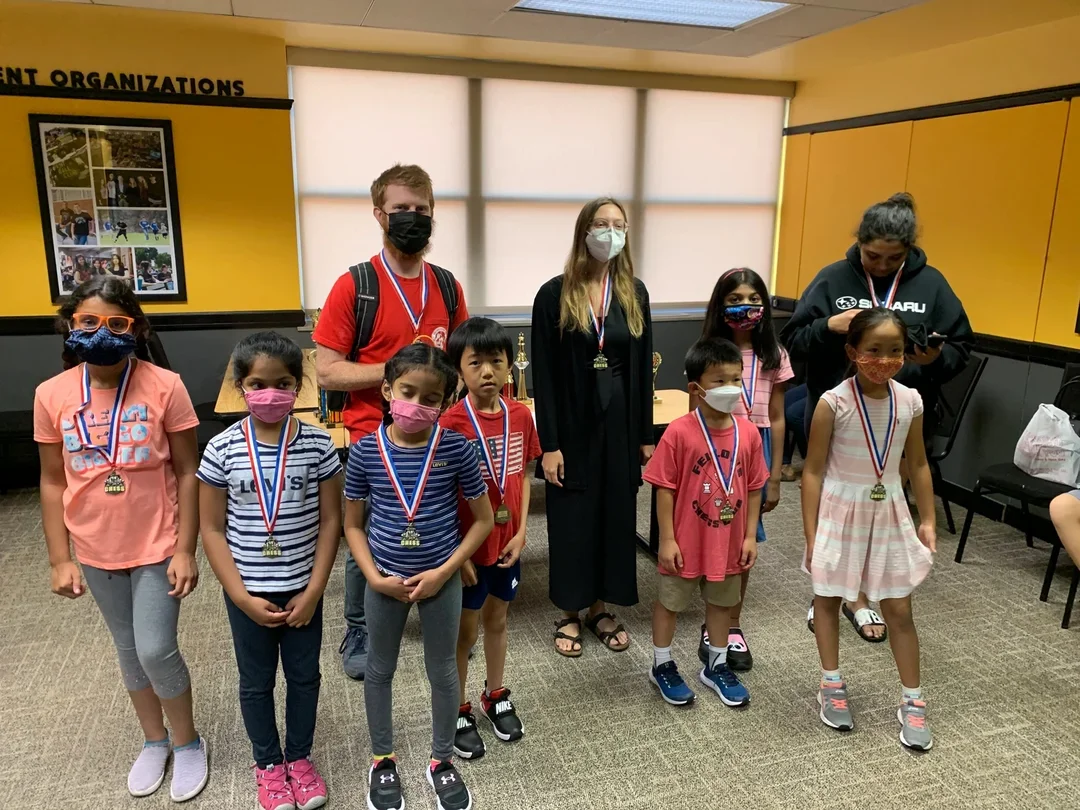
My travels brought me to mall basements, student unions, chain hotels, a high school library with a large and foreboding oil painting of Kramer from Seinfeld, and even a medical practice. I saw adults playing against kids who needed stacks of seat cushions to reach the board. I eavesdropped on sore losers and gloating winners recounting their games in a passionate flurry of alphanumeric coordinates. I had conversations about science, history, etymology, travel, and politics with people from small towns I had never heard of.
It was fascinating to uncover new aspects of the game of chess. For the first time, I had to read my opponents’ psychology, make complex plans, and manage stress over longer time controls. But just as fascinating was the atmosphere. It wasn’t merely the desire to improve my chess that kept bringing me back. There was some other ambient reason, one I couldn’t quite articulate to myself but that I often would ponder while staring out onto the barren I-80 highway or some Marriott lobby between games. Maybe it was my amazement at the fact that a bunch of amateurs who could be doing anything else with their lives decided, again and again, to mentally exhaust themselves for a weekend in some fluorescently lit architectural nightmare just for the sake of a game. Maybe I kept returning with the hope that I might finally understand what this unlikely mix of people doing this unlikely activity all amounted to.
Fast forward to earlier this summer. I was still playing chess, and my studies in literature and translation brought me to Berlin, Germany, where of course I wanted to find some OTB tournaments. One of my close friends suggested I play in the Sparkassen Chess Trophy. She had grown up in Dortmund, the city where it was hosted, and her parents had helped run the event since she was a kid. Her stepdad even played in the higher-rated Open A section before he got sick with brain cancer and had to retire.
My friend told her parents I was interested in participating, and they were generous enough to open their home to me during the nine-day event, the only caveat being that they didn’t speak any English. This would be a bit of a hurdle, as I can read and understand German fluently, but I speak with the linguistic sophistication of a third-grader. Still, I booked my travel and tried to spend some of early June training.
When it was time to head west to Dortmund, I worried the weather was a bad omen. Most of Germany got slammed with torrential rain. I had to slosh my way to the Hauptbahnhof (Berlin Central Station) in a hurry, since my train’s departure time had been pushed back by two hours, probably to compensate for all the delays that were to come (the stereotype that German trains are punctual is a total lie). I arrived at Uwe and Najeeba’s house so much later than expected that there was only enough time to say “Hallo,” eat a quick dinner, and glance at some of Uwe’s antique chess sets and books.
The next day I forced myself out of bed at 6:30 to make it across town to Westfallenhallen in time for Anmeldung (registration) for the Open B tournament. I wasn’t sure what to expect, but what I certainly did not anticipate seeing was a convention center filled with droves of Jehovah’s Witnesses alongside all the chess players. Emerging from the metro, the first thing that came into my view was a giant sign that said: “Übt Geduld” (Practice Patience), the theme of their nearby conference. Not terrible advice for the lot of us, I thought. At various points during the tournament, it was tempting to sneak in and observe their event. I refrained, but after a particularly rough loss later in the week, I did spend some time loitering next to a parking attendant who was listening to a radio broadcast of a speech from inside — a dramatic story in German about God putting the first seed into the earth.
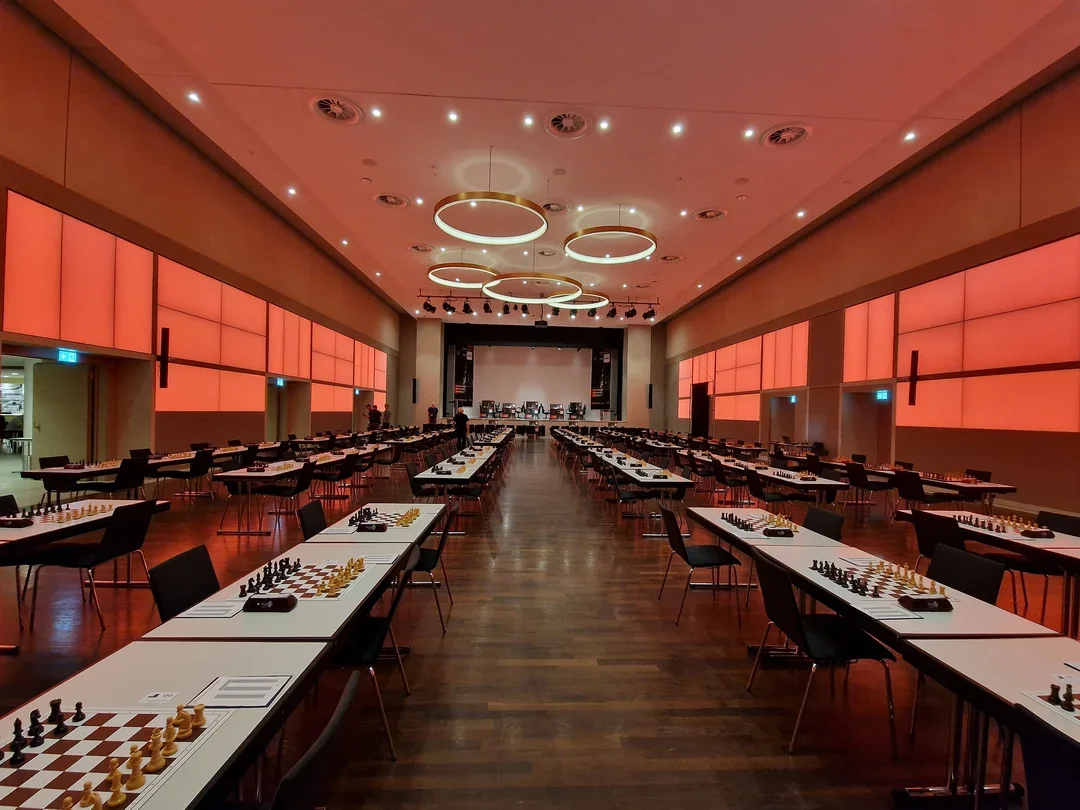
As I entered the playing venue, I was immediately overwhelmed by the sheer number of chess boards. The first hundred or so were in a giant auditorium, with the top five elevated on a big stage with a DGT display behind. The hall was lit with a dim red light that was moody but slightly impractical — so much so, that later in the week, an older participant brought his own janky setup of reading lamps to better illuminate his board. The outside lobby was filled with even more boards. As I’ve come to learn at these events, the worse you play, the more likely you are to be relegated to uglier, noisier environments.
We powered down our phones, took our seats, and after a quick greeting from the arbiters in German and tersely translated English, the round started. I had never been around so many chess games played at once. I felt like I was inside the mind of an engine that was crunching variations. I wanted to walk around and take it all in, but I was too stressed. My opponent had a FIDE rating of around 1600, and back in the U.S., I had played primarily in reserve tournaments with a rating limit of only 1500.
I decided to play the Scotch and was hit with an early ... Qd8-h4 sideline that I hadn’t studied too closely beforehand. I ran down my clock in the opening trying to figure out what to do and got a decent position, but when things simplified, I was in serious time trouble (I probably practiced too much Geduld) and played inaccurately, losing a few pawns, and allowing my position to crumble. Not the best start, but my opponent was very kind, so it was hard to be too upset. He offered me some of his mints halfway through the game and chatted with me in German after. He was excited to hear that I came all the way from the U.S., and he made a point to wish me “Viel Erfolg” (Germans wish you “much success” instead of “good luck”) before each coming round.
After finishing my early morning round, I decided to stay and watch the games starting in the afternoon. Around 3 p.m., hundreds of strong and titled players flooded the convention center for the Open A tournament, the closed NRW Cup, and the No Castling Masters event. I was starstruck and didn’t know where to look. Fortunately, after telling this to Uwe, he brought me upstairs, where GM Klaus Bischoff was providing excellent live commentary in German that gave a narrative arc to the tournament.
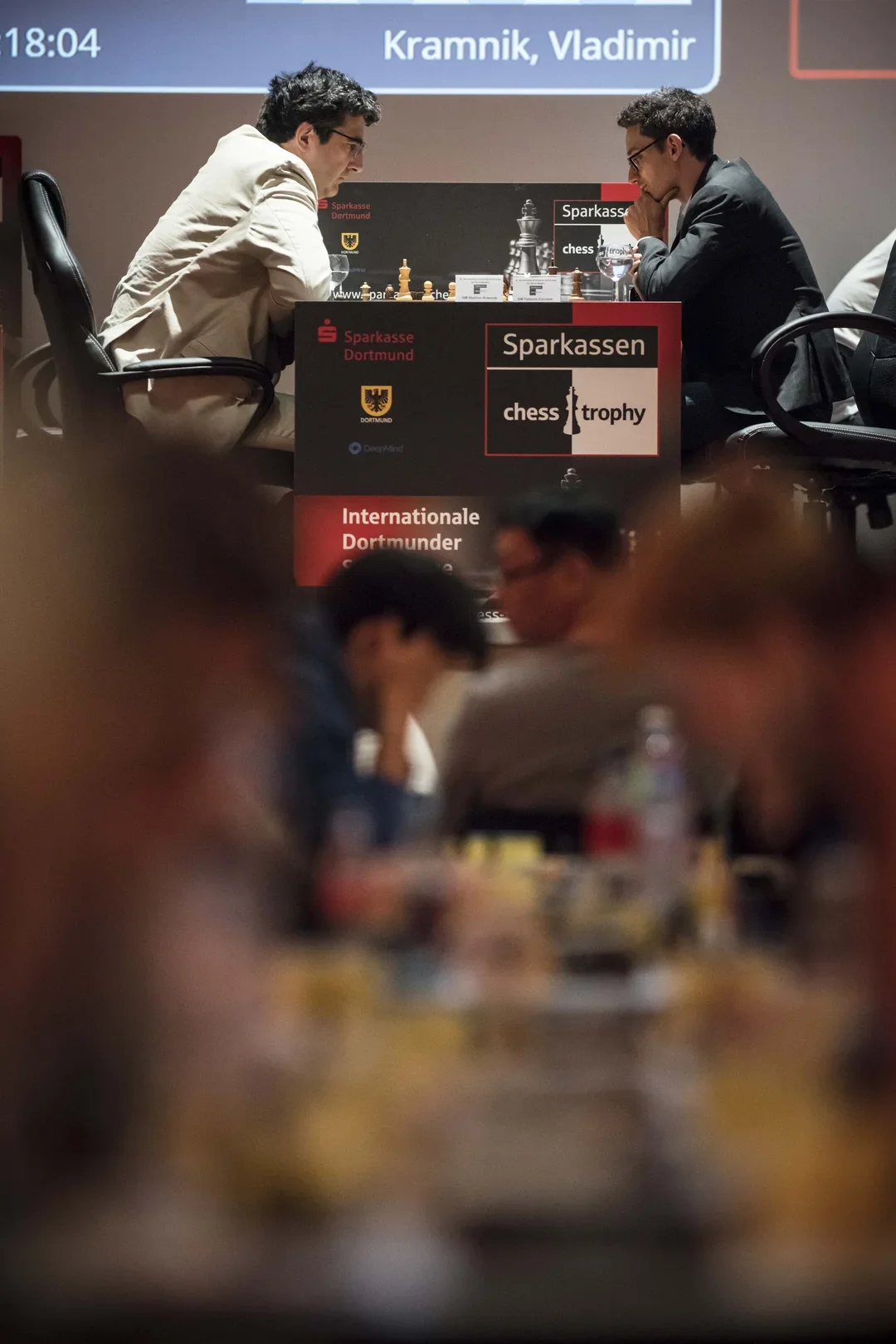
The iconoclasts — GMs Fabiano Caruana, Pavel Eljanov, Vladimir Kramnik, and Dmitrij Kollars — explored new intricacies and ideas in no-castling chess. In the open A section, English GM Michael Adams consistently remained dominant, playing almost all his games on board three. Germany’s #2 and #3 players, GMs Matthias Bluebaum and Alexander Donchenko, also had a close fight for the top; on a later day, after Donchenko made a quick draw, he wandered into the commentary room, looked at a random analysis board for a half-second, launched into a mile-a-minute, theoretical explanation of the Two Knights Caro-Kann, and then wandered out with a little wave. In the NRW Cup, 12-year-old FM Hussain Besou was competing formidably against much more experienced players, including the famed German streamer IM Georgios Souleidis, also known as “The Big Greek.” WGM Dinara Wagner and IM Ruben Gideon Koellner also put up thrilling fights in an attempt to secure GM norms.
I came to enjoy the cadences and peculiarities of German chess-speak. Exchange sacrifices were quality sacrifices or “Qualitätsopfer.” Castling was “Rochieren,” a word historically linked to the word rook, which the Germans strangely refer to instead as the “Turm” or tower. A draw was a “Remis,” derived from the French but close to the English remit. You don’t play on the kingside but in the elegant sounding “Königsflugel,” the “king’s wing.” Pieces “schlagen” or strike each other rather than taking or capturing. When doing post-game analysis with my opponents, I kept having to remind myself to use the word “Dame” rather than “Königin” (to my chagrin, the Germans say “lady” rather than “queen”). Little phrases from den Klaus got stuck in my head. Geht’s schon los. Das kommt nicht in Frage. Schwer zu sagen, wer hier besser steht. I would repeat them to myself while I was playing. Er sagt sich da drüben, bin ich in Sicherheit. Es ist noch nicht ganz zu Ende. Es ist schon vorbei.
The days to come followed a roughly similar pattern. In the morning, I would play a round, always bookended by some chit-chat, mostly in German. Over the course of my rounds, I met a few fellow graduate students from around Nordrhein-Westfalen, including one who was going to move to the Midwest soon for a Ph.D. in mathematics. I also talked with a man whose wife was a literature professor up near Rostock and an engineer who studied technical English in the 1960s.
One pre-game interaction was slightly less cordial after I accidentally addressed my opponent with the informal du instead of the formal Sie. I couldn’t tell if he was offended, but he almost crushed my hand with a forceful handshake afterward, and I think he was upset later when I beat him in a tricky bishop and pawn endgame. I had fun discussing the Catalan with one of my other opponents but was a bit shocked to hear him say that during our game, he kept trying to remember if it was true that Stephen King came from Maine, and was wondering if I was from the same part of Maine as Stephen King, thinking, “Hmm, she is also a writer, it would be cool if she knew him, but she probably doesn’t do that kind of writing, who knows?”
Meanwhile, I felt like I was on the ropes and couldn’t let my mind stray from the board for one moment. Chess is cruelly nonreciprocal.
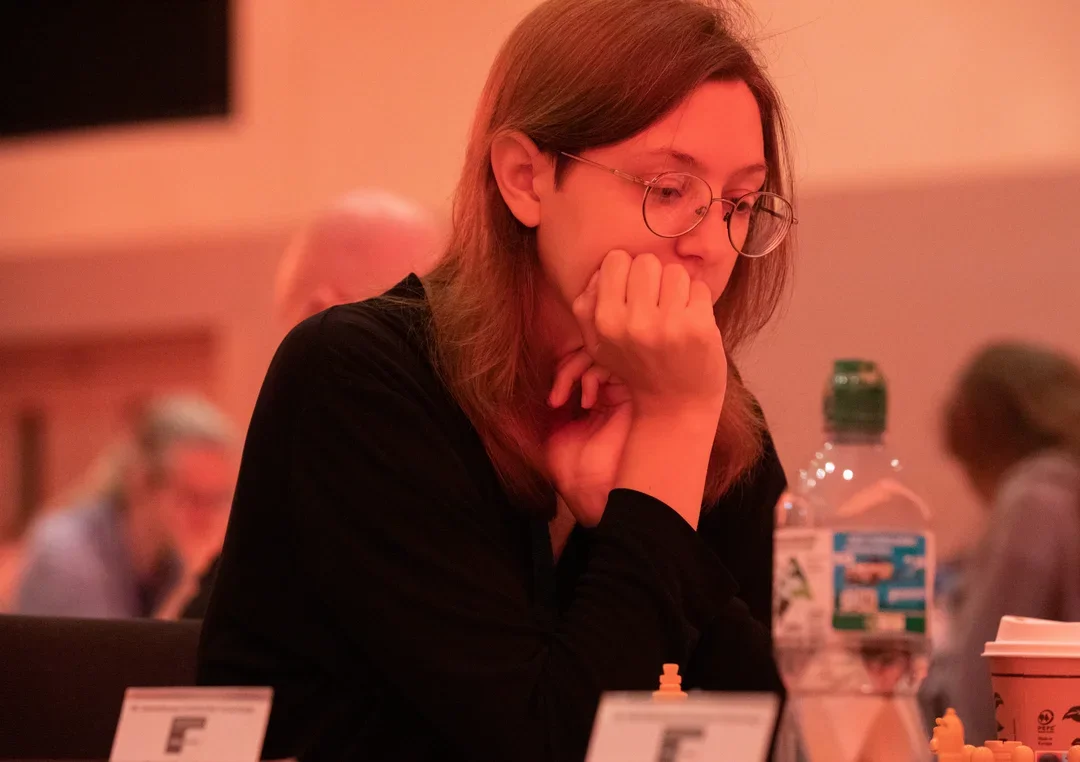
On the days when I was too tired and downtrodden to bear hanging around the playing hall, I would walk, zombie-like, into town to acquire some cake or other refined carbs. As I ate them in the park to the faint sound of a trombone, I thought I was hallucinating my own circus background music until I spotted the street musician producing the noise through some distant trees. Otherwise, I would linger around the playing hall, where I entered my games into Lichess or looked at the chess books on display until the afternoon rounds began. After watching the commentary for a few hours, I would take the metro back out to the suburbs and go to sleep almost immediately, with the hopes that somehow, I could restore enough energy to continue playing the next day.
One welcome wrinkle in my routine was my dinner with fellow American players WGM Tatev Abrahamyan, WGM Gulrukhbegim “Begim” Tokhirjonova, and GM Fabiano Caruana. We all decided to meet for a late meal on Sunday, the hottest day of the week, and Germany’s Ruhetag (rest day), when many restaurants and businesses are closed. It was over 80 degrees with what felt like 80% humidity. After my long metro ride to their hotel, we walked for more than a half hour in search of a place to eat.
First, we followed Fabiano’s lead in the direction of a good Italian restaurant he remembered going to in 2016. (I was going to make a joke that I felt like a human chess piece, but I thought that would be weird.) The restaurant did exist, and he impressively got us there without the help of a map, but it wasn’t open. We continued to wander until we found a Tunisian restaurant where the waiter only spoke German (and French, but that helped none of us). I was somewhat grateful for this since it meant that my existence was not entirely superfluous. As I translated what the appetizer of the day was, and that, no, the waiter said Fabi couldn’t have the Arabic coffee now, because it is best served after dinner, I wondered what my life would be like if I had come to the game of kings earlier.
I wish I could say that we had a deep conversation about chess, philosophy, and life, but I felt on the verge of a heat stroke and didn’t want to be irksome by turning the dinner into an interview. So we talked a bit about cheating scandals, openings that are good when castling is off-limits, Begim’s upcoming game against former world champion GM Ruslan Ponomariov, Friends, and Marvel movies. Tatev and Fabi sat facing the window and were distracted by a man on the upper floor of the building across the street who was cleaning his house in his underwear. When the waiter asked me how Begim wanted her steak cooked, the necessary words exited my mind, and I ended up saying something like “with an average level of bloodiness.”
I was finding it hard to justify to the group exactly why I was there, in Dortmund, playing chess and writing this article. The label “freelance writer” doesn’t carry much prestige, and it was difficult to tell a bunch of chess professionals that I was interested in their sport mainly by accident, after following some vague, yet consuming, aesthetic whim. At that time, I thought maybe a more noble angle for the article could be chess and translation or “Chess as a Multilingual Nexus.”
On my walk back to the metro, I chatted with Begim about our shared love of languages. She learned chess in Uzbek, then Russian, then English, and she said she always enjoyed hearing a mix of different vocabularies at tournaments and trying to decipher what people were saying. I completely agreed and felt excited when I heard stray bits of Polish or French or Dutch — languages I had a bit of familiarity with — at this tournament. But while I had a messy, interesting bilingual experience in Dortmund, one that I hope to have someday in other countries with other languages, I don’t know if it was universal. Chess, like any sport, is a way to bring speakers of many languages together, but it is not always a place of much linguistic exchange. At chess tournaments, people make things work with the often-limited bandwidth and language resources that they have.
As the tournament came to a close, I felt both disappointment and relief. My performance was middling, but I was proud of the decent chess I played before hitting my wall of tiredness around game six. Now that I’ve built more stamina, I’m excited to play in further FIDE tournaments —next stop, the Kieler Open.
Before dispersing, we all came together to celebrate the victors and the 50th anniversary of the Sparkassen tournament. The closing ceremony was half entertainment variety show and half chess laudation. Serious German speeches by various public officials about the importance and value of the game were interspersed with puzzles from Sparkassen games of old and bullet and blindfold exhibitions played by GMs Artur Yusupov, Klaus Bischoff, and WIM Fiona Steil-Antoni. I couldn’t help but chuckle internally when the mayor of Dortmund referred to the city as a chess “Hochburg” (stronghold), which sounds eerily like “Hüpfburg” (bouncy castle).
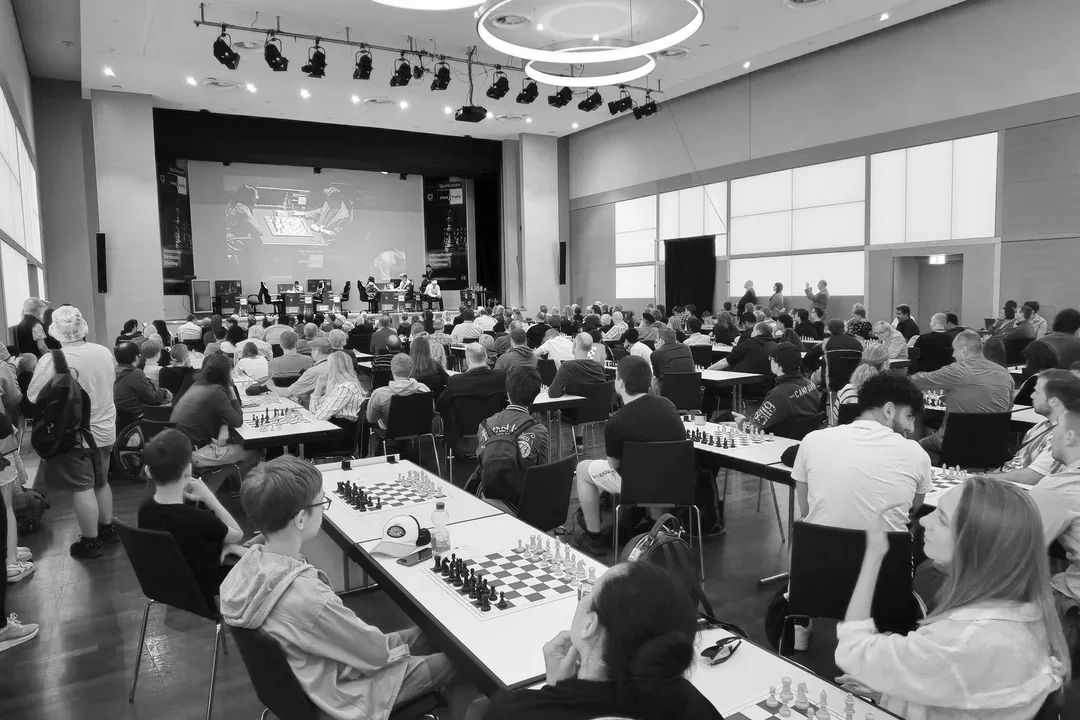
And despite my love for the game, some of the well-meaning remarks about how “exciting” it was to finally see more women in attendance (as if it was some divine accident, and not the result of a hard struggle for equity), and remarks about how chess could be a diplomatic alternative to war, rang hollow. Obviously, we should champion fairness and peace, but whether anything we accomplish over the board can bring about any real social or material change, and whether successes in the chess world can ever reflect something greater — well, let’s say that I am skeptical.
Regardless of where it takes place, amateur chess strikes me as a fundamentally marginal activity. Chess is a prime excuse, really, for people like me to dwell on the edge of real life, if only for a short while. If anything became clearer to me over these nine days, it’s that the amateur chess tournament doesn’t have to be a utopia where the ideals of contemplation and restraint are fully realized. It is a place of useless and exceptional interactions, mostly awkward and alienating, but sometimes profound, and that is enough.
Categories
Archives
- January 2026 (4)
- December 2025 (27)
- November 2025 (29)
- October 2025 (39)
- September 2025 (27)
- August 2025 (29)
- July 2025 (43)
- June 2025 (25)
- May 2025 (24)
- April 2025 (29)
- March 2025 (29)
- February 2025 (20)
- January 2025 (24)
- December 2024 (34)
- November 2024 (18)
- October 2024 (35)
- September 2024 (23)
- August 2024 (27)
- July 2024 (44)
- June 2024 (27)
- May 2024 (31)
- April 2024 (51)
- March 2024 (34)
- February 2024 (25)
- January 2024 (26)
- December 2023 (29)
- November 2023 (26)
- October 2023 (37)
- September 2023 (27)
- August 2023 (37)
- July 2023 (47)
- June 2023 (33)
- May 2023 (37)
- April 2023 (45)
- March 2023 (37)
- February 2023 (28)
- January 2023 (31)
- December 2022 (23)
- November 2022 (32)
- October 2022 (31)
- September 2022 (19)
- August 2022 (39)
- July 2022 (32)
- June 2022 (35)
- May 2022 (21)
- April 2022 (31)
- March 2022 (33)
- February 2022 (21)
- January 2022 (27)
- December 2021 (36)
- November 2021 (34)
- October 2021 (25)
- September 2021 (25)
- August 2021 (41)
- July 2021 (36)
- June 2021 (29)
- May 2021 (29)
- April 2021 (31)
- March 2021 (33)
- February 2021 (28)
- January 2021 (29)
- December 2020 (38)
- November 2020 (40)
- October 2020 (41)
- September 2020 (35)
- August 2020 (38)
- July 2020 (36)
- June 2020 (46)
- May 2020 (42)
- April 2020 (37)
- March 2020 (60)
- February 2020 (38)
- January 2020 (45)
- December 2019 (34)
- November 2019 (35)
- October 2019 (42)
- September 2019 (45)
- August 2019 (56)
- July 2019 (44)
- June 2019 (35)
- May 2019 (40)
- April 2019 (48)
- March 2019 (61)
- February 2019 (39)
- January 2019 (30)
- December 2018 (29)
- November 2018 (51)
- October 2018 (45)
- September 2018 (29)
- August 2018 (49)
- July 2018 (35)
- June 2018 (31)
- May 2018 (39)
- April 2018 (31)
- March 2018 (26)
- February 2018 (33)
- January 2018 (30)
- December 2017 (26)
- November 2017 (24)
- October 2017 (30)
- September 2017 (30)
- August 2017 (31)
- July 2017 (28)
- June 2017 (32)
- May 2017 (26)
- April 2017 (37)
- March 2017 (28)
- February 2017 (30)
- January 2017 (27)
- December 2016 (29)
- November 2016 (24)
- October 2016 (32)
- September 2016 (31)
- August 2016 (27)
- July 2016 (24)
- June 2016 (26)
- May 2016 (19)
- April 2016 (30)
- March 2016 (36)
- February 2016 (28)
- January 2016 (32)
- December 2015 (26)
- November 2015 (23)
- October 2015 (16)
- September 2015 (28)
- August 2015 (28)
- July 2015 (6)
- June 2015 (1)
- May 2015 (2)
- April 2015 (1)
- February 2015 (3)
- January 2015 (1)
- December 2014 (1)
- July 2010 (1)
- October 1991 (1)
- August 1989 (1)
- January 1988 (1)
- December 1983 (1)







